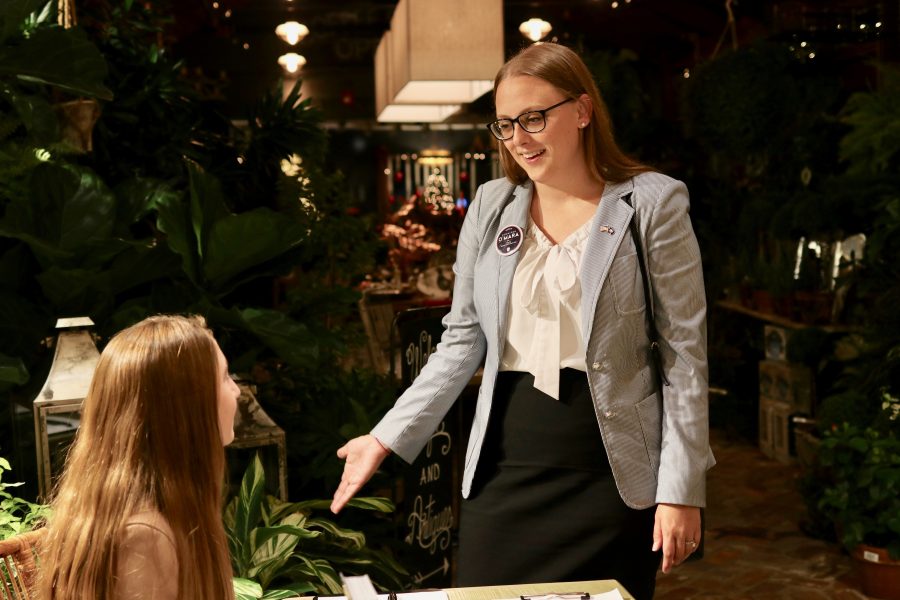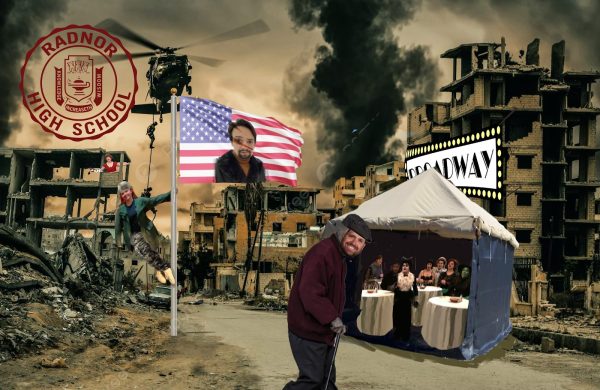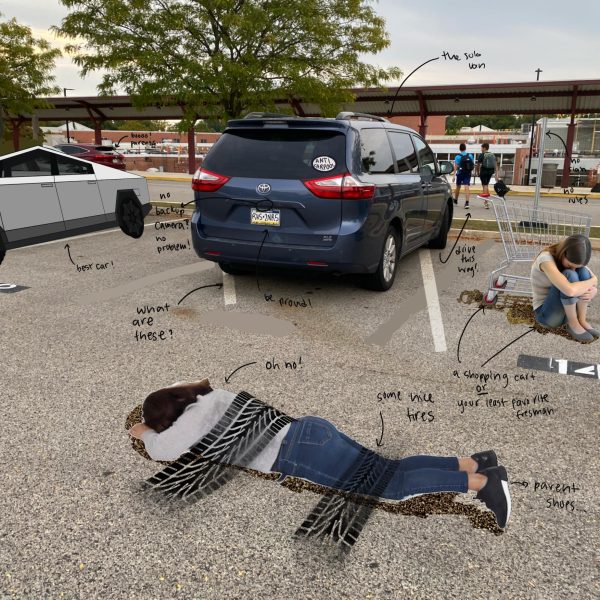An Interview with Candidate for State Representative from PA-165, Jennifer O’Mara
November 1, 2018
“Hey, nice to meet you—I’m Jenn!”
The informality and friendliness of her tone was surprising. As high school students, we had grown accustomed to addressing adults in the proper way, using appropriate titles and last names. While seeing O’Mara use her shortened first name to introduce herself felt strange at first, we soon found this relatability to be a consistent theme in her campaign, perhaps an attitude molded by her past.
The interview began with Jennifer O’Mara describing her early life. She grew up in Southwest Philadelphia, went to a Catholic school, St. Barnabas Parish, and attended West Chester University. O’Mara lived with her two youngers brothers and her parents, until her family lost her father to gun suicide. This tragedy, as O’Mara explained, led her to undertake larger responsibilities from a young age:
“My mom got a job as a school bus driver in Upper Darby, and that meant she left the house really early, so I, as early as fourteen, started getting my brothers ready for school, and doing homework with them when they would come home, and start getting dinner ready, and that kind of stuff. Growing up as the oldest, when you lose one of your parents, you step up in a lot of ways, and so I think I grew up fast.”
These difficulties ultimately instilled a sense of discipline and hardwork. As a first generation college graduate, she recalled navigating FAFSA by herself, working three jobs, and driving home every weekend to work in DELCO. Eventually O’Mara decided to pursue further education at Penn in order to obtain her teaching degree.
So what motivated O’Mara to make the decision to run for office instead? We asked her to discuss how her experiences affected this decision:
“I think I realized that my story is sad in some ways, but it isn’t unique in a lot of ways. There are families all over this county and all over our state, all over the country, that have very similar struggles. And I felt like our elected representatives have gotten so out of touch with the average working person that they don’t understand what we are going through; they don’t get the daily struggle that most people are facing.”
Hearing O’Mara acknowledge that her story “isn’t unique in a lot of ways,” was both interesting and unexpected. Often times, people reference their past in order to draw some sort of distinction between themselves and others. This is especially true in politics, where leveraging personal experience can be used as another “qualification.” O’Mara, on the other hand, embraced the “commonness” of her experience. To her, this was a point of unity. To her, this was the reason to run.
We followed up by asking her to explain the core values of her campaign and why it seemed to resonate with others. O’Mara’s response, unsurprisingly, reflected both her history of hard work and dedication to the “average person.” She described going door-to-door with her team members in order to hear people’s concerns directly. In doing so, she found that many people respected her honesty and transparency, even those who had disagreements with her policies and party. As O’Mara stated, “we’re giving people a chance to participate and be involved, and let their voices be heard, even if it’s a voice that you don’t always agree with.”
After hearing O’Mara talk about her heavy engagement with the community, we wondered if there were any particular moments that she remembered as especially impactful. As it turned out, a few days prior to the interview, O’Mara had knocked on the door of a man with signs up for the opposite party. Her willingness to hear the man’s opinions made such an impression upon him that he decided to vote for O’Mara simply for stopping by to listen.
While her past as a working class citizen has allowed her to relate to people on both sides of the aisle, O’Mara’s youth and gender have also been relevant aspects of her campaign. While the nationwide increase in female candidates is not just promising, but rather crucial for political progress, the focus often seems to fall disproportionately on the gender aspect rather than policy aims and overall candidacy. When discussing her position as a young female in politics, O’Mara specifically stated that she didn’t “want to be defined by [her] gender. [She] wanted to be a candidate.”
It seemed completely reasonable that she would want the merits of her candidacy to be the focus of discussion; unfortunately, as she revealed, lingering stereotypes surrounding her gender have manifested themselves through other’s comments. For example, O’Mara recalled receiving “unsolicited advice on [her] clothes, hair, the length of [her] hair, the shape of [her] pants, on [her] shoes.” Comments displaying such a fixation on minute details are telling of the unique environment that O’Mara—and other females— have to navigate in the political sphere.
O’Mara also spoke about her marriage to her husband Brad, a disabled veteran and two-time Purple Heart recipient, that has challenged traditional gender roles:
“I work; my husband stays at home. When we tell people that, they’re so surprised. So living the opposite of a gender stereotype is a cool experience[…] I think trying to let people know that it’s great that women are running, and we need to, but we shouldn’t only talk about that[…] A lot of people ask me ‘What are you going to do if you have kids?’ and, you know, ‘Why are you running and not your husband?’ or, ‘What’s your husband doing if you’re not at home taking care of the house?’ My relationship is the opposite of many stereotypes.”
Yet, in spite of the misperceptions and challenges O’Mara has faced as a new candidate, she remains optimistic. In fact, her campaign slogan is “There is more that unites us than divides us.” We became curious about her reasoning behind this approach to her campaign, especially under the extremely polarized political environment. Atkinson, finding O’Mara’s attitude particularly refreshing, asked “Why do you believe [in your slogan], why do you think we have become so divided, and what do you think we should do about it?”
In her response, O’Mara began by reflecting on her own family dynamic, where both Democrats and Republicans were able to get along. As she put it, “we all wanted the same things; we just looked at it differently.” That principle remained true during her door-to-door outreach, where she heard similar concerns from people on both sides of the political spectrum. Health care, taxes, kids’ safety, and schools were a few notable recurring issues. She also expressed her disappointment in the media’s role, stating that “ the media divides us even further because we’re looking at an outlet that only is really reporting one side of it or an outlet that is only is reporting the other side of it.” So, what was her solution to this seemingly irreconcilable politicization? Her answer was simple:
“Let’s get back into our own backyards. Let’s have conversations. Let’s get outside and talk to one another.”
Woo, intrigued by this straightforward answer, asked her to elaborate. O’Mara responded with an anecdote from a Springfield event.
“We heard, you know, from one side, someone say, ‘well, we need great public schools, and this is why,’ and then another senior citizen say, ‘yeah, but I am having trouble paying those taxes,’ right? And it just so happened that it was a Democrat saying one thing and a Republican saying the other. We were then able, in sort of a conversation, to talk about, ‘well yes, you’re both right. We do need good public schools because it makes our property values better and helps our community, but we can’t make it so that our taxes are so high that our own residents are leaving. So where can we find a common ground?’”
Although we recognized the importance of this political discourse, as high school teenagers, the discussion of property values and public taxes among senior citizens felt distant. As a result, we wondered what O’Mara thought about topics like college. Seeking clarification on her view of tertiary education, Atkinson asked, “Having received your education from a public institution and having worked for a private institution, what is your position on the cost of universities nationwide?”
O’Mara’s answer outlined two primary points. The first point involved an expansion of grant programs/scholarships and “bolstering the foundations that support our public institutions.” The second point involved discussing the alternatives for high school students right after they graduate.
As students from Radnor, the latter point that O’Mara made about alternatives to a four-year degree was a concept that we had never really considered before. To students at Radnor, college seems like a given. But as O’Mara said, “It’s not all college. It’s not all a four-year degree.” Woo followed up by asking, “What advice would you give to those younger students who are hoping to make a difference, whether it is by furthering their education immediately or getting engaged with the community right after high school?”
O’Mara, a 28- year old familiar with the student experience, offered her insight:
“My advice would be to find what you’re passionate about and pursue it, because you need to enjoy what it is that you’re going to do. As someone who went to college thirty minutes from home, I regret now not looking farther. I think young people, we often think about the older people in our lives and what expectations they put on us. It’s hard, and you sometimes feel selfish if you take a step back from those expectations and instead think of your own expectations, but I think it’s important to do that. We’re in a very hyper connected world, and it’s good to sometimes unwind, take a step back, and be a tiny bit selfish for yourself.”
At this point we decided to broaden the scope of the conversation to gain a better sense of her aspirations for the Democratic Party as a whole:
“I am very excited and hopeful with the amount of engagement that we’re seeing around a midterm election. I have never seen so many young people engaged in an election before. I have never seen so many first time candidates running. This year, the Democrats have more state house candidates running than they ever have, and that kind of energy isn’t going to go away after this election. I think what we can collectively appreciate out of the 2016 election is [that] it spurred a political awakening. ”
While O’Mara’s positivity and energy inspired her campaign and motivated her followers, we also knew that the tumultuous political environment often troubled people. Sometimes people, in fear of being caught in the verbal crossfire, refuse to engage in politics or activism altogether. We voiced these concerns to O’Mara, asking her for an opinion on the subject as well as advice she’d like to give.
O’Mara’s answer: “Vote.”
“Vote and bring five people with you. Use your one, one voice that we have, that we all have, and participate, because it’s not going to change until we vote. It’s not going to change until we elect new people on both sides of the aisle. And I would also say, if you’re feeling completely disgruntled, and the news is so much, it is ok to take a step back. It is ok to not watch the news for a couple of days, and to unplug, and to take care of yourself. And then get back into it. Find an organization and volunteer with them. It doesn’t have to be a campaign, you know, there’s a lot of issue based organizations right now. What’s your issue? If it’s the environment, go work for the Sierra club or volunteer for PennEnvironment. If it’s gun safety, Moms Demand would love to have you. Do something, because you’ll feel better once you do something.”
Her words encapsulated a belief in the people’s potential. Although she understood the nauseating effect of the news, O’Mara stressed the importance of taking an active role in advancing a cause. To conclude the interview, we wanted the students and families at Radnor to understand what Jennifer O’Mara would do if she is elected. So, we asked her to summarize her goals for Harrisburg:
“I want to try and make it so Harrisburg is functioning better and more ethically. Right off the bat, I want to make it so legislators don’t get paid if they don’t pass a budget. We don’t get paid if we don’t do our work. I want to work on strengthening the DEP and making sure that our environment is protected in a state where we do have fracking. I want to work on common sense gun laws because we, in our district, just had a scare at the Springfield mall on Saturday, and people are very upset. It can be anywhere, and we don’t want it to be here. I want to work on fixing the PA house and the PA senate website. It is so hard to navigate. If you want to find a bill and just see what’s being voted on, you almost have to have a degree to navigate it. And, you can’t click on an amendment and read what the amendment vote is. You can only read the bill. For amendment votes, you have to do a right to know request. I just feel like that website is archaic, and we need to make it easier for voters to digest the information. So on my website, I want to have a, you know, here’s what’s voting and here’s how this might affect our district. Here’s what you need to know; call me and tell me what you think about it. I want to try and hear from people more and educate our voters on what’s happening in Harrisburg, because Harrisburg impacts your life more than DC does. But you don’t hear about it, because there’s one journalist that covers Harrisburg. It’s absurd, and they’re very happy to not have us paying attention. My final thing, I would say, well two things, we need to get the fair funding formula expanded fully in Pennsylvania: right now only seven percent of funds move through it, we need a hundred percent, and a census is coming. 2020. And then we’re going to redraw our district lines, and they’re very gerrymandered right now. We need to do everything we can to make sure that that does not happen when we redraw these lines, for state senate and for congress. So I have a lot on my to-do list.”
We all smiled at that last statement.
“But hey, I’ve already been told I can’t run a campaign, and we did, so imagine what I can do if I get there.”
We reached out to Jennifer O’Mara’s opponent, Alexander Charlton, for an interview, but did not receive a response.







